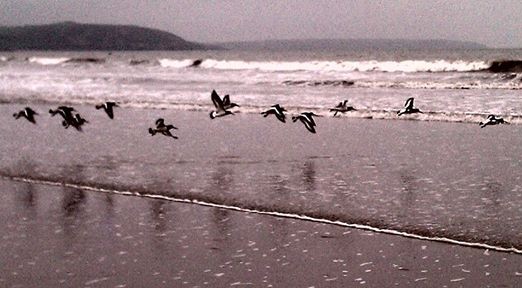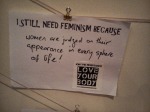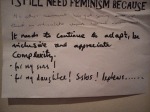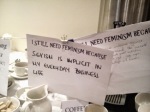We’re in a Fourth Wave of Feminism. Did you know that? I didn’t. The suggestion that society is 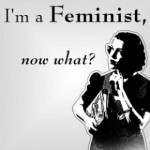 in the grips of a fourth wave, saddens me. Why? Because I’m left wondering why we need a fourth wave when we have already had a first, second and third. Yes, I do know the previous waves dealt with different aspects of the same issues but it’s very sad to think, despite the mammoth efforts and life sacrifices made by previous generations, it remains the case that equality seems an impossible dream.
in the grips of a fourth wave, saddens me. Why? Because I’m left wondering why we need a fourth wave when we have already had a first, second and third. Yes, I do know the previous waves dealt with different aspects of the same issues but it’s very sad to think, despite the mammoth efforts and life sacrifices made by previous generations, it remains the case that equality seems an impossible dream.
Discovering this new wave has left me with lots of questions, the answers to which are not easily found. As a first step on my path to knowledge I decided to take matters into my own hands: last week I attended a conference in Dublin organised by the National Women’s Council of Ireland. I needed to find out why all these waves are crashing desperately at our shores. Before I go on, I must tell you that I’m not the kind of feminist that has or will burn her bra BUT I have throughout my life struggled to remove the corset that restricts me and countless others. You could say I have a problem with my under garments. The corset that restricts women is not what you could call supportive: one in five women have experienced violence from a partner, 13.9% gender pay gap in Ireland, 30% gender equality target for political parties by 2016, 40% proposed gender equality target for Boards, 4,000 Irish women still travel to have abortions in the UK each year, 40,000 calls to help lines on Violence Against Women each year, 52% of women avoid certain areas for fear of violence and 98,000 are on the waiting list of social housing (Source: Women Rising/2014 Manifesto from NWCI). The facts speak for themselves.
To say I was excited to take part in this event would be an understatement. That morning, despite the very grey clouds that loomed over Ireland’s capital, I walked down O’Connell Street full of purpose. I imagined myself sitting in a room, full of people who were all dedicated to the cause – equality; people from all sorts of backgrounds, all ages, all creeds, women and men. I was in the company of two other feminist friends – educated, intelligent women who like me wanted to hear what our peers had to say. Where are we on the journey to equality? Why is it taking so long? A fourth wave, deary me are we just going around in roundabouts repeating the same mistakes?
In my opinion feminism means equality: for all. When I think of the word equality, I see an image of the Scales of Justice in my mind. A simple, yet very powerful image that needs no fancy explanation for what it represents or strives to achieve: a society of equals. However, you don’t need to be a brain scientist to know that this is not how things are in the real world. In our global economy, egalitarian thought is dying. In this world there is no real desire to address the re-distribution of wealth, never mind the fundamentals in life such as health care, education, housing, justice, poverty, and social inclusion for men or women. Equality has become more of an ideal than a practise – a remote god that is worshipped but not an actual experience. Not only this, but as soon as the word equality is mentioned its polar opposite i.e. inequality rears its ugly head. Dare I say it, but has the word equality become a dirty one? Isn’t it sad how words can become tarnished over the years? Isn’t it sad that we still say the fight for equality? Isn’t it sad that we can’t relax and assume that equality will just happen? Why is it always a fight?
At 9.15 am I left the grey skies outside and moved quickly into the warm lobby of the conference venue. A quick glance revealed that the event was well subscribed, lots of women milling around however, one glaringly obvious fact: no men. We entered the conference room via a set of stairs leading downstairs –as we descended the marble steps my friend whispered to me, “It feels like we’re going down into the basement, how bloody symbolic”. We took our seats at the back, the top rows were not an option i.e. lots of eager feminists had claimed top row positions. Happy with our seats, we settled ourselves, had a cup of the complimentary coffee and a good look around. After about ten minutes, the panel took their seats and it began: the BIG debate. The panel were introduced and one by one they took to the podium, told us their stories, their views and what feminism meant to them. The individual speakers each raised very valid points and issues, but I must admit I felt disappointed. They addressed an audience full of feminists – each of us converted in our own way – so I didn’t need to hear about what feminism is. All around me I saw women nod their heads in emphatic agreement. They preached to the converted. It wasn’t a debate it was mild-mannered reflection. I wanted to hear about where we were heading, what amazing changes were on the horizon and what is the fourth wave? In my opinion, it felt too sanitized, safe and a little boring.
Towards the end there was a Q & A Session during which some very interesting issues were raised by the audience. The panellists did their best to answer those questions but to be completely honest from a panel of four speakers (not including the event organisers) I only felt and heard passion from two (young women who are making great strides in combating sexism that is found in the media). That’s not to say the others didn’t feel passionate but in my opinion, if they did it was not imparted effectively, at least not to me. The real passion was in the audience: in the young women who had fabulous ideas on how to progress feminism through dynamic and inclusive Social Policy; I heard passion from one audience member who has worked for over 35 years with disadvantaged communities fighting for the right for women and men to have access to health care; and when an older lady spoke and explained about how she is currently working on changes in the education curriculum for our schools so that each boy and girl will learn about equality, I felt passion.
Thankfully two of the panellists knew and spoke about this new wave. What is its call to arms? Like the previous waves that began in response to particular elements, this wave is responding to a new set of challenges and notions. It appears that it is the internet that has enabled the shift from the third to the fourth wave. In essence, it has created a “call-out” culture in which sexism or misogyny can be challenged. In other words, challenging sexism as it appears in everyday life such as: advertising, film, TV, literature, the media etc. The internet has facilitated the creation of a global community of feminists but is that enough to mark a new era of feminism? I think it’s too early to say. On the flip side, one could argue that the internet has helped create some of the blatant media driven sexism we see all the time. It is a double edge sword. The internet certainly provides a forum for discussion and a pathway for activism e.g. the Everyday Sexism Project and No More Page 3 campaign, two campaigns that have captured the imagination of the public. But is that all that will happen? Capture imagination. The internet has re-invigorated feminism allowing like-minded people to connect, but will this lead to real change and transform political actions and decision making?
I left Dublin that day with more questions than I had arrived with. It is quite possible that I will spend the rest of my life trying to figure it all out. In the meantime, I sincerely hope that we can get our act together. I hope it won’t take a tsunami to change the way we treat and see each other; it might just wipe us clean off the planet and allow another species become the experts in equality.
For further information: everydaysexism.com & nomorepage3.org
